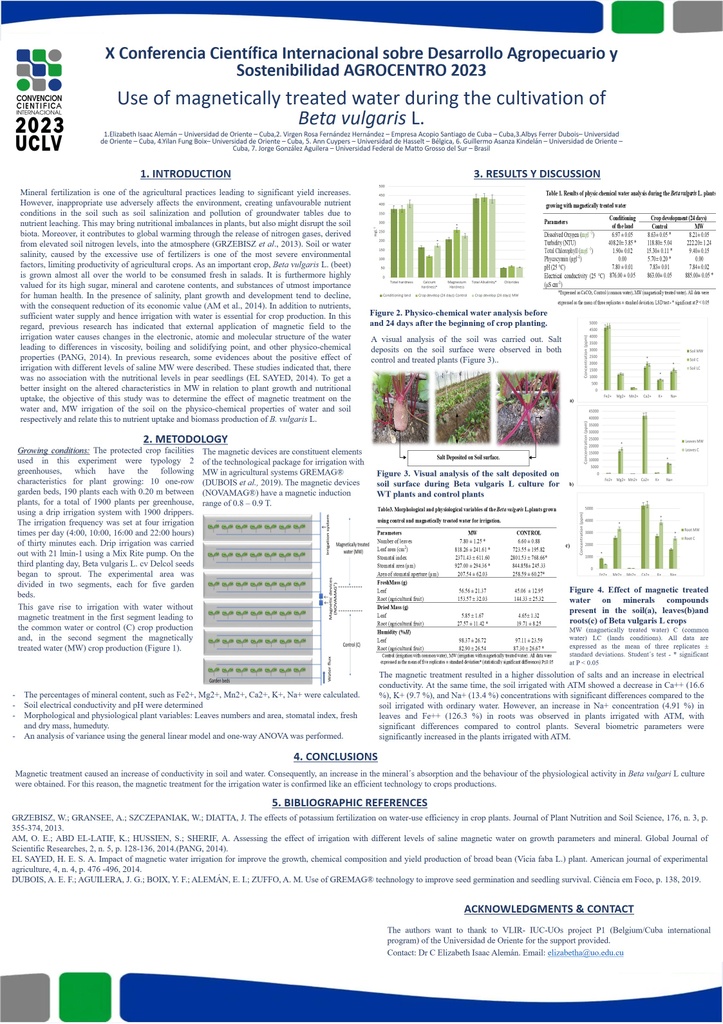Executive Secretary

9th International Scientific Conference on Agricultural Development and Sustainability
10th Symposium of Agronomy

Abstract
Mineral fertilization is one of the agricultural practices that lead to significant yield increases. Its inappropriate use negatively affects the environment, creating unfavourable soil nutrient conditions, such as soil salinization and contamination of water tables due to nutrient leaching, which leads to nutritional imbalances in plants, but could also alter soil biota. In this study, the effect of magnetically treated water on the physicochemical properties of water and soil, as well as nutrient uptake during the growth of Beta vulgaris L. Plants were irrigated with magnetically treated water (MTA), treatment group; and with ordinary water (C), control group. The MTA was obtained using a magnetic device in the range of 0.8 - 0.9 T magnetic induction. The magnetic treatment resulted in a higher dissolution of salts and an increase in electrical conductivity. At the same time, the soil irrigated with ATM showed a decrease in Ca++ (16.6 %), K+ (9.7 %), and Na+ (13.4 %) concentrations with significant differences compared to the soil irrigated with ordinary water. However, an increase in Na+ concentration (4.91 %) in leaves and Fe++ (126.3 %) in roots was observed in plants irrigated with ATM, with significant differences compared to control plants. Several biometric parameters were significantly increased in the plants irrigated with ATM.
Resumen
En este estudio se evaluó el efecto del agua tratada magnéticamente sobre las propiedades físico-químicas del agua y del suelo, así como la absorción de nutrientes durante el crecimiento de Beta vulgaris L. Las plantas fueron regadas con agua tratada magnéticamente (ATM), grupo de tratamiento; y con agua común (C), grupo de control. El ATM se obtuvo utilizando un dispositivo magnético en el rango de 0,8 - 0,9 T de inducción magnética. El tratamiento magnético provocó una mayor disolución de sales y aumento de la conductividad eléctrica. Al mismo tiempo, el suelo regado con ATM mostró una disminución en las concentraciones de Ca++ (16,6 %), K+ (9,7 %) y Na+ (13,4 %) con diferencias significativas respecto al suelo regado con agua común. Sin embargo, en las plantas regadas con ATM se observó un aumento de la concentración de Na+ (4,91 %) en las hojas y de Fe++ (126,3 %) en las raíces, con diferencias significativas respecto a las plantas control. Varios parámetros biométricos se incrementaron significativamente en las plantas regadas con ATM en comparación con las plantas control, más concretamente para sus pesos fresco y seco de hojas (25,5 - 25,1 %) y raíces (6,4 - 39,8 %), respectivamente. En conclusión, el tratamiento magnético provocó cambios en los parámetros físico – químicos del agua y el suelo, incrementando la absorción de algunas sales por las plantas.
About The Speaker

Elizabeth Isaac Aleman

Discussion

